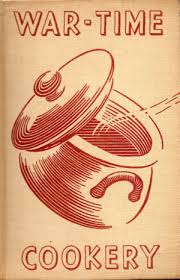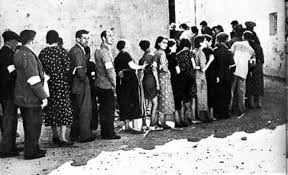As I explain at the end of this post I sat down to write something else: an inoffensive post about a recipe from my grandmother’s village. That post took an unexpected detour into family history but also Spanish history and politics. I hope you will be able to read the love between the lines, but also the anger. The anger will explain the terrifying photograph of small children doing the fascist salute as they visit their incarcerated Republican fathers in jail in 1939. I find it so upsetting that I almost censored myself. I now realise that news about the possible discovery of the location of Lorca’s unmarked grave have stirred me.
For someone who has spent the last year assiduously thinking and writing about food and its cultural purchase I have very little interest in recipe books. I wonder why this is: I do like books and food as separate items. I don’t have a problem with the aspirational consumption masquerading as creation they embody. The same thing can be said about books about design and, in fact, most coffee table books and I love those. I used to live with a friend who treasured them: they lined the wall of the kitchen we shared. They were as a rule sturdily yet lavishly put together: thick covers, inventive fonts and layout, expensively lit and studiously composed shots. Yet not even once did I cook following their recipes. I suspect my parents and their own disinterest in cookery books may be behind my own.
I think of their approach to cooking and I realise that it reflects their character, their gender, their age. My father, like most men of his generation in Spain, is an occasion cook. He will prepare the roast lamb we invariably eat on Christmas Eve. He makes a fabulously colourful seafood salad filled to the brim with prawns, mussels, crab, and tuna when he wants to fete friends: the salad reflects his largesse. This material generosity is reflective of his character and attitude to life: he is a man of deeds rather than words. Love walks the walk with him. It also goes beyond his individual history and temper: most Spaniards of his generation pile food on their tables out of an anxiety born out of early deprivation. Madridians like my father grew up in a grey city haunted by a Civil War that had barely ended when they were born. Misery and squalor hollowed the stomachs and starved the spirit of its working class. A fried egg was a Sunday treasure; children plucked the leaves of a tree tellingly known as “pan y quesillo” (“bread and cheese”) and stuffed them in their mouths to stave off hunger; a handful of marzipan figurines were the only present received on the day of the Epiphany. These children were used to the smell of fried innards wafting from corner bars; rarely had proper chocolate; were given a bright orange “American cheese” that came in aid packages. So older Spanish men show their prosperity with their well-stocked larders and generously furnished dinner tables.
My mother, by contrast, although never ungenerous, is thrifty and riffs like a Jazz musician in her daily shopping. She leaves the house to buy hake and comes back with keenly priced steak after extracting a solemn promise that she will not be disappointed and a couple of chorizo sausages from the butcher. She brings marvellously unexpected combinations of fruits: a pineapple that bursts in your mouth sweet and sourly, bags of mahogany chestnuts, pomegranates that she patiently deseeds until her fingers are tainted red and wrinkled. How could she have any interest in the tyrannies of recipe books full of unheard of spices and cream? Memory, necessity, and pleasure, dosed measure by measure, inform her cooking. These cannot be found in print anywhere.
When it comes to food, my parents speak a language that is all nouns and verbs. There are no adjectives: they will never subtitle their dishes in brackets. Food hits the stomach and the palate with a forceful thud. Ingredients transition from counter to pan and then on to table with admirable integrity: an honest steak, roughly chopped then freshly grilled vegetables, a piece of fruit that you peel at the table.
Today I sat down to write a recipe from my grandmother’s village: I was going to dissect it and for once give you what most expect from a food blog. Another time. I now live in another country: I am not my grandmother, or even my mother; I am a woman of another time that speaks another language groping in the darkness of food memory and culture. The book that can guide me has not been published.




